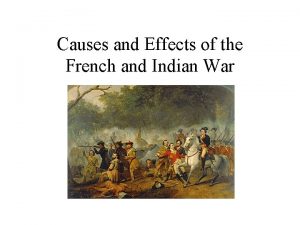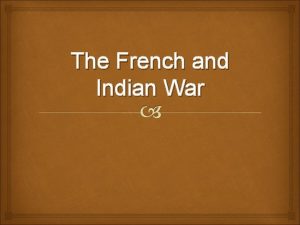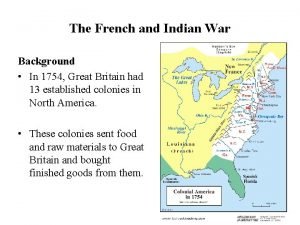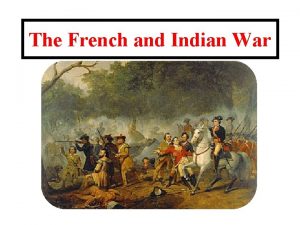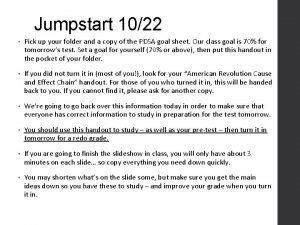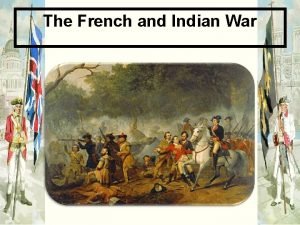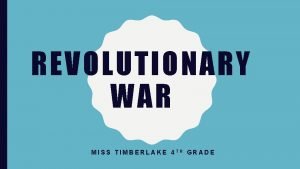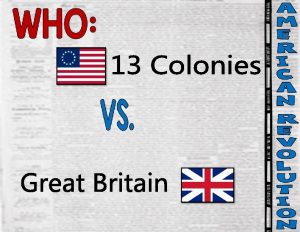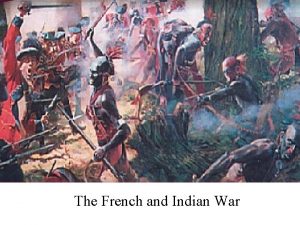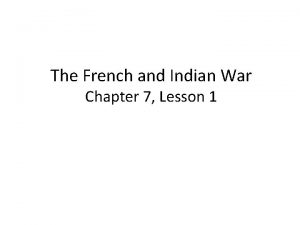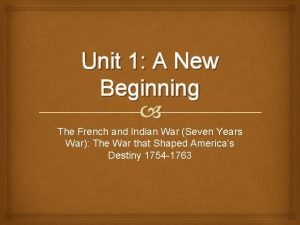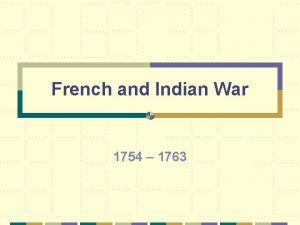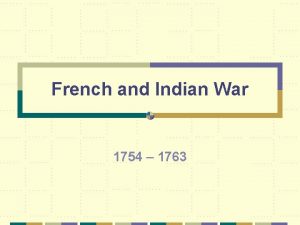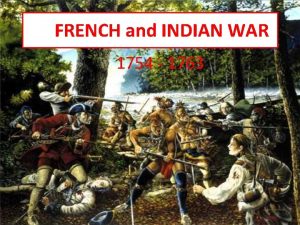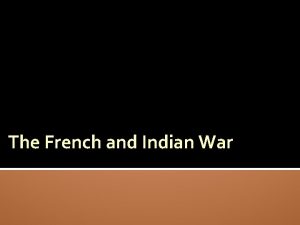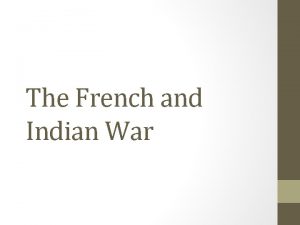The French and Indian War The French and














- Slides: 14

The French and Indian War

The French and Indian War (1754 -1763) AKA: “The Seven Years War” -starts in America! Starts when George Washington attempts to force the French to evacuate Fort Duquesne (modern-day Pittsburgh, PA). He and the Virginia militia are defeated at nearby Ft. Necessity, and his forced confession starts the war.

First British Offensive British General Edward Braddock, trying to capture Fort Duquesne, is ambushed and he and half of his men are killed or wounded at the Battle of the Monongahela, near 38: 30 Pittsburgh PA.

A String of Failures Although the British capture French forts in Nova Scotia, French general Marquis de Montcalm captures Fort William Henry (before the ensuing “massacre”), and defeats a British force attacking Fort Ticonderoga (both in upstate New York)

FT. BEAUSEJOUR FT. TICONDEROGA FT. WILLIAM HENRY BRADDOCK’S EXPEDITION

William Pitt • British de facto Prime Minister • Decides to focus on eliminating the French threat for good • Sends his best generals, more men, ships, and supplies to the war zones around the world (India, Europe, Africa, and America) • Spends LOTS of money • Promised to include colonial forces and reimburse the colonies for their war expenses.

Roger’s Rangers • Started by New Hampshire’s Robert Rogers • Soldiers who moved quickly and fought Indian-style. • Looked down upon by the regular British army • The origins of today’s Army Rangers. 1. If you have the good fortune to take any prisoners, keep them separate, till they are examined, and in your return take a different route from that in which you went out, that you may the better discover any party in your rear, and have an opportunity, if their strength be superior to yours, to alter your course, or disperse, as circumstances may require. 2. If you march in a large body of three or four hundred, with a design to

LOUISBOURG ST-FRANCOIS FT. FRONTENAC FT. DUQUESNE FT. TICONDEROGA

The Turning Point • The British capture forts throughout America – but Quebec City & Montreal remain the key to New France. • In 1759 British General James Wolfe led his troops to Quebec, and surrounded the city on the Plains of Abraham in a surprise attack.

WOLFE WINS! (but dies, as does the Marquis de Montcalm) • The French lose the Battle of Quebec, and a few months later Montreal. The war ends in 1763.

Treaty of Paris - 1763 England gets: Canada, all land east of the Mississippi River, and Florida (from Spain) Spain gets: All land west of the Mississippi River, and New Orleans France gets: Kicked out of North America

Rupert’s Land NFL Mexico “ 1 Louisiana 4 C ol on ie s” da a n Ca Florida

Ru pe r t’s La NFL nd e eb c Qu Lo ” ui on i 5 C ol “ 1 na es sia Mexico

British Empire, 1763
 Causes and effects of the french and indian war
Causes and effects of the french and indian war Where did the french and indian war take place
Where did the french and indian war take place Cause of french and indian war
Cause of french and indian war Causes of french and indian war
Causes of french and indian war French and indian war summary
French and indian war summary French and indian war
French and indian war Brainpop french and indian war
Brainpop french and indian war Who was in debt after the french and indian war
Who was in debt after the french and indian war French and indian war
French and indian war French territory in north america 1754
French territory in north america 1754 French and indian war
French and indian war French and indian war
French and indian war New beginning in french
New beginning in french French and indian war
French and indian war French and indian war
French and indian war
